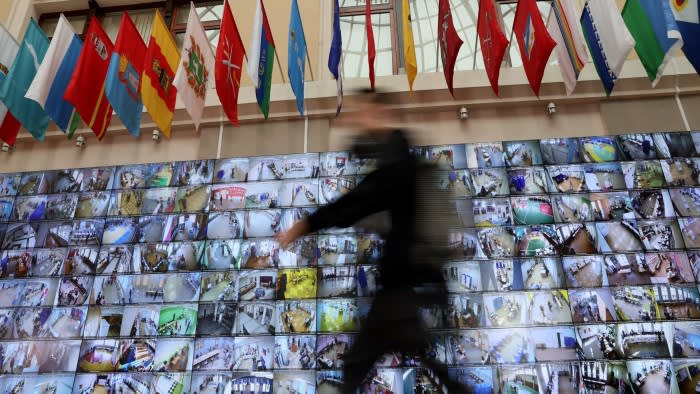Vladimir Putin is cruising to victory in Russia’s presidential election, cementing his rule for another six years amid his invasion of Ukraine and brutal suppression of dissent.
The result of the three-day election ending on Sunday is a foregone conclusion after the Kremlin outlawed all criticism of Putin or the war and blocked any opposition candidates from running.
The longest-serving ruler since Joseph Stalin, Putin has solidified his grip on power despite western efforts to impose harsh economic sanctions on Moscow for the invasion of Ukraine. Russia’s army has regained the initiative against outmanned and outgunned Ukrainian forces while the Russian economy has rebounded thanks to a wartime surge in defence spending and economic lifelines from countries such as China.
Putin has appeared increasingly confident of a Russian victory after a Ukrainian counteroffensive failed last year and the US Congress has failed to approve fresh aid for Kyiv.
Russia’s arms industry is working in round-the-clock shifts, the army has replenished its troops with hundreds of thousands of men, and countries including Iran and North Korea have supplied Moscow with additional munitions.
The partial annexations of four Ukrainian regions in 2022 and incremental frontline gains since then, however, have cost Russia more than 350,000 in casualties, as well as significant equipment losses and damage from Ukrainian strikes behind the front lines.
Ukraine stepped up a series of drone attacks mostly targeting cities near the border and fuel infrastructure this week, which Putin said was an attempt to disrupt the vote. Three people died during attacks over the weekend in Belgorod region, which has borne the worst of the spillover from Ukraine, according to governor Vyacheslav Gladkov.

Putin’s repression of domestic dissent since the invasion has left him with no challengers after Alexei Navalny, his most prominent opponent, died in a remote Arctic prison colony last month. Navalny’s family and supporters have been forced into exile and have blamed Putin for his death, an allegation the Kremlin denies.
The three lawmakers who were allowed on the ballot alongside Putin support the war and have avoiding criticising the Russian president.
From exile or prison, opposition leaders had urged supporters to go to the polls en masse at noon on Sunday in Navalny’s memory and vote against Putin. Hundreds of people followed the call, according to footage posted on social media.
“My wife, my friend and I came to the polling station around twelve,” said Danil, a corporate lawyer who lives in a northern Moscow neighbourhood. He said that a “visible line” of people of all ages started forming at noon.
“I expected problems, that the authorities would close the station at noon. But except for the line, the was nothing extraordinary,” Danil said.

Vera, a young woman in Moscow, said she came to vote at midday to show “with purpose” her opposition to Putin, “that I do not support everything that is happening in the country.”
“It was important for us to feel part of a community of decent people, that there are still people who are against all of this, so we went to vote at noon.”
Abroad, even longer lines formed in cities with large Russian émigré populations including Dubai, Almaty and Berlin, where Navalny’s widow Yulia Navalnaya queued to vote.
One of the longest lines was recorded in the Armenian capital, Yerevan, which is home to one of the largest Russian communities.
Elena, a podcast editor, said she travelled from neighbouring Georgia, which does not have a Russian embassy, with more than a dozen friends. “I understand that my vote won’t change anything, but I think it’s an important event to observe and to see how many of us are there,” she said.
In London, the queue outside the Russian embassy that formed towards noon was nearly 2km long. Alina, 25, a student from the Siberian city of Kogalym, said she came to the polling station because “we have very few rights in our country, and we must exercise the ones we have left”.
Russian police detained more than 65 people on Sunday including for writing “No to war!” on a ballot, wearing a T-shirt with Navalny’s name on it, or trying to slip a photo of the late opposition leader into the ballot box, according to independent rights monitor OVD-Info.
In the first two days of the election, dozens were arrested across Russia for setting voting booths on fire, or throwing Molotov cocktails at polling stations.
Some local officials attempted to explain away the protests. Authorities in Novosibirsk, Siberia’s largest city, claimed the noon queues had been caused by repair works.
Independent election monitor Golos, whose co-chair Grigory Melkonyants was jailed last year, said authorities had also coerced public sector employees into voting early or pushed them to vote online.
Additional reporting by Daria Mosolova in London
